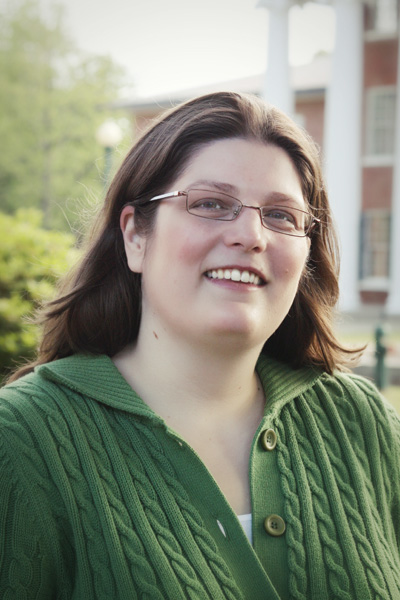OXFORD, Miss. – Rachel Smith Purvis, a doctoral student in history at the University of Mississippi, has been awarded the Cassius Marcellus Clay Post-Doctoral Fellowship at Yale University.
“Shocked, I think, is the best way to describe my reaction to the fellowship,” said Purvis, a native of Tampa, Fla. “It was truly unexpected; it was not something that I anticipated happening at all. But it was a wonderful surprise. I’m truly honored to represent the university. It’s a very humbling experience.”
Purvis is to lead a discussion on “The Reconstruction Treaty of 1866: Importance, Impact and Legacy” at 3:30 p.m. Friday (April 27) in Bishop Hall, Room 108.
The two-year fellowship is offered in affiliation with the Gilder Lehrman Center for the Study of Slavery, Resistance and Abolition. It is aimed at candidates “performing independent research in 19th-century U.S. history with a special interest in the age of slavery, emancipation, the Civil War and Reconstruction.”
Purvis’s dissertation, “Maintaining intact our homogeneousness: Race, Citizenship, & Reconstructing Cherokee,” fits this description perfectly.
“In a nutshell, my dissertation looks at how the Cherokee rebuilt themselves after the Civil War and how they experienced the process of Reconstruction,” Purvis said. “What is really interesting is that some of the things that the Southern states went through during Reconstruction, Indian states also went through.
“There are a lot of small parallels between what went on in the Cherokee nation to what went on in the reconstructed South. It’s kind of an interesting way to look at Reconstruction – a way that is typically not a main focus of history.”
Purvis has high expectations for her tenure at Yale. Besides teaching a course during the second year of the fellowship, she hopes to turn her dissertation into a book.
“I would like to take my dissertation and turn it into a book manuscript, which this fellowship at Yale will really help me do,” Purvis said. “Then hopefully I can find an academic press that is interested in publishing it. That is the next phase for this research.”
Purvis credits the UM Department of History for her success.
“I have to credit the amazing history department, they have really prepared me for this,” she said. “Our faculty are very well-trained and come from strong institutions that include the Ivy League, which means we as graduate students greatly benefit from their academic experience through their instruction, scholarship and advising. They have a very intense and rigorous academic schedule for us in the Ph.D. program. They have done a wonderful job preparing us to compete on such a high level.”
John Neff, associate professor of history, advised Purvis throughout her doctoral work. He feels that her research is “exciting and bold” and that it will influence the way that historians now think about post-Civil War America.
“Rachel was awarded this fellowship because of the importance of her scholarship,” Neff said.
“Her research into the Cherokee Nation reveals a remarkable set of parallels between the post-war experiences of the Cherokee and the American nation at large. All of the aspects of the American reconstruction existed within the Cherokee Nation: the Cherokee were divided by the war and contributed combat troops to both the Union and the Confederacy; a significant number of the Cherokee had been slave-holders, and subsequently had to cope with the emancipation of their human “property”; the Cherokee struggled to incorporate their former freedmen and freedwomen within their body politic.
“The Cherokee Nation, however, experienced all of that while contending with the American government over issues of sovereignty and self-governance. As Rachel demonstrates, much of the later federal policies imposed during Reconstruction were actually ‘field-tested’ in Indian territory.”
Joe Ward, chair of the history department, feels that Purvis’s success will have a positive influence on the department’s graduate program.
“This is a tremendous recognition of the value of Rachel’s research, an award that she has fully merited through her patient determination to advance knowledge of her subject,” Ward said. “Her success should encourage her fellow graduate students to seek answers to questions that have the potential to challenge our current understanding of the past.”
Purvis completed her undergraduate degree at the University of Arkansas in 2002. She finished her master’s in history at UM in 2005 and continued on to work towards a doctorate in history. Purvis plans to defend her dissertation this summer and leave for Yale in August.
For more information on the history department, visit http://history.olemiss.edu/.
